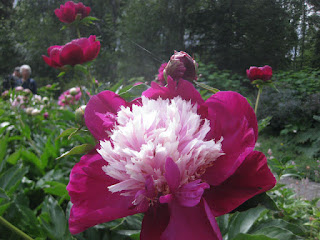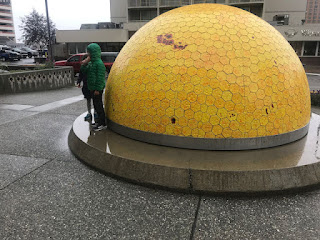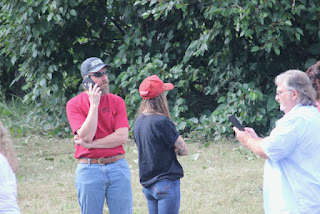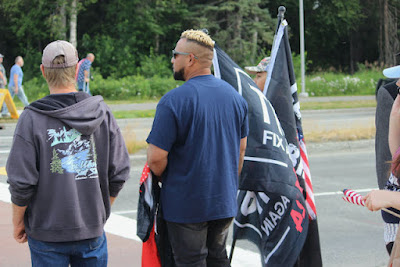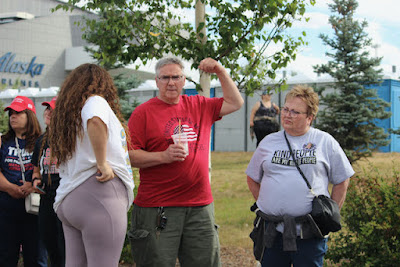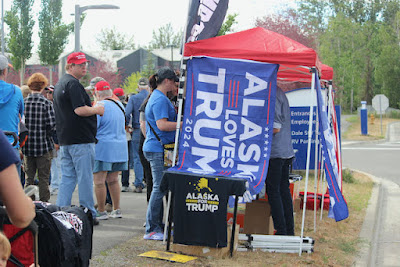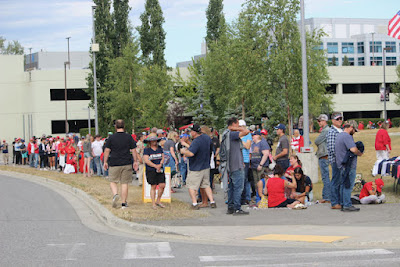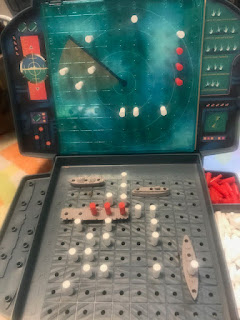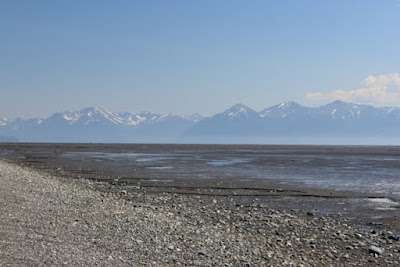Yesterday I gave you flowers, now back to graver stuff. But I think you'll find this inspiring.
I've posted about Colum McCann's Apeirogon before. It was not even an appetizer. Less even than the menu. And this might be a very light appetizer of a very heavy book.
I'm going to take you to the crucible. One of the two key sections that the book is leading up to and then retreating from. This is section 500 - in the middle of the book. (I'm saying section because chapter isn't right. Each section could be anything from a line to half a dozen pages.) After section 500 comes section 1001. Then another section 500 and back down eventually to a second section 1.
Rami and Bassam have both lost daughters - Rami to a suicide bomber in Jeruselum and Bassam to an Israeli police rubber bullet. They've lived parallel but totally separate lives. The narrator gives us glimpses at events, and then we see the events again, but from a slightly different perspective. There are a lot of birds who remind us they've been around much longer than the humans and that we are part of a much larger natural world.
By section 500 we know Rami and Bassam quite well. And we've walked through the scenes that led to their daughters' deaths and what happened in the following years repeatedly. In their respective sections 500, Rami and Bassam put their whole stories together in one long narration each. It takes place in Beit Jala in the West Bank. When I went back to reread section 1, it was Rami riding his motorcycle up to the monastery, though I had no idea of how that would fit into the story then
I'm going to give excerpts from Rami's speech to the people assembled in the monastery because I think it is extraordinary and very relevant to humans around the world and in the US.
I think these passages are compelling, but readers might not be so inspired they way I've offered them. But please read the bolded parts at least.
It begins:
"My name is Rami Elhanan. I am the father of Smadar. I am a sixty-seven-year-old graphic designer, an Israeli, a Jew, a seventh-generation Jerusalemite. Also what you might call a graduate of the Holocaust. My mother was born in the Old City of Jerusalem, to an ultra-Orthodox family. My father came here in 1946. What he saw in the camps he seldom spoke about, except to my daughter Smadar when she was ten or eleven. I was a kid from a straightforward background - we weren't wealthy but we weren't poor. I got in some trouble at school, nothing big, I ended up in industrial school, then studied art, more or less an ordinary life."
He talks about his time in the Army as a young man during the Yom Kippur war. He went to art school afterward and met his future wife and had four kids.
"I was doing graphic design - posters and ads - for the right-wing, for the left wing, whoever paid money. Life was good. We were happy, complacent. To be honest it suited me. . .when this incredible bubble of ours burst in midair into a million pieces. It was the beginning of a long cold dark night the is still long and cold and dark and will always be longh and cold and dark, until the end when it will still be cold and dark.
I have told this story so many times, [as the author has leading us to this point] but there is always something new to be said. Memories hit you all the time. A book that is opened. A door that is closed, a beeping sound, a window opened. Anything at all. A butterfly.
Then he describes in detail the day his daughter died. Hearing about a bombing on the car radio and checking mentally where all his family should be that day. Then calling to be sure everyone is ok.
More details of what happened that day. Then the funeral. The people who come to his house afterward - his wife's father was an important person in Israel and there are thousands at the house and in the streets.
"Look, I have a bad temper. I know it. I have an ability to blow up. Long ago, I killed people in the war. Distantly, like in a video game. I held a gun. I drove tanks. I fought in three wars. I survived. And the truth is, the awful truth, the Arabs were just a thing to me, remote and abstract and meaningless. I didn't see them as anything real or tangible. They weren't even visible. I didn't think about them, they were not really part of my life, good or bad. The Palestinians in Jerusalem, well, they mowed the lawns, the collected the garbage, they built the houses, cleared the plates from the table. Like every Israeli, I knew they were there, and I pretended I knew them, even pretended I liked some of them, the safe ones - we talked about them like that, the safe ones, the dangerous ones - and I never would have admitted it, not even to myself, but they might as well have been lawn mowers, dish washing machines, taxis, trucks. . . And if they were ever anything other than objects, they were objects to be feared, because, if you didn't fear them then they would become real people. And we didn't want them to be real people, we couldn't handle that. A real Palestinian was a man on the dark side of the moon. This is my shame. I understand it as my shame. I know that now. I didn't know it then. I don't excuse myself. Please understand, I don't excuse myself at all."
He continues about how he attempted to go on with his life - brushing his teeth, making posters at work. But thoughts invade. Killing others won't bring his daughter back.
"Then about a year after Smadar was killed, I met a man who changed my life. His name was Yitzhak Frankenthal, a religious Jew, Orthodox, with a kippah on his head. And you know, we tend to put people into drawers, stigmatize people? We tend to judge people by the way they dress, and I was certain that this guy was a right-winger, a fascist, that he eats Arabs for breakfast. But we started talking and he told me about his son Arik, a soldier who was kidnapped and murdered by Hamas in 1994. And then he told me about this organization, the Parents Circle, that he had created - people who lost their loved ones, Palestinian and Israeli, but still wanted peace. And I remembered that Yitzhak had been among the thousands and thousands of people that came to my house a year before during those seven days of shiva for Smadar, and I was so angry with him, so confused, I asked him, How could you do it? Serious, how could you step into someone's house who just lost a loved one, and then talk about peace? How dare you? You came to my house after Smadar was killed? You took for granted that I would feel the same way as you, just because I was Matti Peled's son-in-law or Nurit Peled's husband, you thought you could take my grief for granted? Is that what you thought?"
". . . I got on my bike and I went to see. I stood outside where people were coming for the meeting, very detached, very cynical. And I watched those people arriving. The first group were, for me - as an Israeli - living legends. People I used to look up to, admire. . .
But then I saw something else, something completely new to me, to my eyes, my mind, my heart, my brain. I was standing there, and I saw a few Palestinians passing by in a bus. Listen, this flabbergasted me. I knew it was going to happen, but still I had to do a double take. Arabs? Really? Going into the same meeting as these Israelis? How could that be? A thinking, feeling, breathing Palestinian? And I remember this lady in this black, traditional Palestinian dress, what a headscarf - you now, the sort of woman who I might have thought could be the mother of one of the bombers who took my child. She was slow and elegant, stepping down from the bus, walking in my direction. And then I saw it, she had a picture of her daughter clutched to her chest. She walked past me. I couldn't move. And this was like an earthquake inside me: this woman had lost her child. It maybe sounds simple, but is was not. I had been in a sort of coffin. This lifted the lid from my eyes. My grief and her grief, the same grief.
I went inside to meet these people. And here they were, and they were shaking my hand, hugging me, crying with me. I was so deeply touched, so deeply moved. It was like a hammer on my head cracking me open. An organization of the bereaved. Israeli and Palestinian, Jew, Christian, Muslim, atheist, you name it. Together. In one room. Sharing their sorrow. . . I cannot tell you what sort of madness it seemed. And I was completely cleaved open. It was like a nuclear event. Truly, it seemed mad."
He tells us he was forty-seven or forty-eight at the time . . .
". . . it was the first time that I'd met Palestinians as human beings. Not just workers in the streets, not just caricatures in the newspaper, not just transparencies, terrorists, objects, but - how do I say this? - human beings - human beings who carry the same burden that I carry, people who suffer exactly as I suffer. An equality of pain. And like Bassam says, we are running from our pain to our pain. I'm not a religious person, far from it - I have no way of explaining what happened to me back then. If you had told me years ago that I would say this, I would have said you were crazy."
All that, so far, is so relevant to the US today. Whether we are talking about blacks and whites, about rich and poor, about gay and straight, about men and women, about religious fundamentalists and atheists, about Republicans and Democrats. So many are just objects, caricatures.
But it gets even more significant as we watch people like DeSantis try to ban people from knowing things he doesn't want them to know. Organizations like Fox reporting fictional worlds as if they were real.
"Some people have an interest in keeping the silence. Others have an interest in sowing hatred based on fear. Fear makes money, and it makes laws, and it takes land, and it builds settlements, and fear likes to keep everyone silent. And, let's face it, in Israel we're very good at fear, it occupies us. Our politicians like to scare us. We like to scare each other. We use the word security to silence others. But it's not about that, it's about occupying someone else's life, someone else's land, someone else's head. It's about control. Which is power. And I realized this with the force of an ax, that it's true, this notion of speaking truth against power. Power already knows the truth. It tries to hide it. So you have to speak out against power. And I began, back then, to understand the duty we have to try to understand what's going on. Once you know what's going on then you begin to think: What can we do about it? We could not continue to disavow the possibility of living alongside each other. I'm not asking for everyone to get along, or anything corny or airy-fairy, but I am asking for them to be allowed to get along. And, as I began to think about this, I began to think that I had stumbled upon the most important question of them all: What can you do, personally, in order to try to help prevent this unbearable pain for others? All I can tell you is that from that moment until today, I've devoted my time, my life to going everywhere possible, to talk to anyone possible, people who want to listen - even to people who will not listen - to convey this very basic and every simple message, which says: We are not doomed, but we have to try to smash the forces that have an interest in keeping us silent."
The pages on this blog rarely have such long quoted passages. But there is nothing I can say that could possibly have more impact than the words the author puts on Rami's tongue. (The book is described as fiction based on the lives of these two men. The author, an Irish man who has experienced his own split world, tells us, that two two speeches at the center of the book - the one I'm quoting - and Hassam's - "are pulled together from a series of interviews in Jerusalem, New York, Jericho and Beit Jala, but elsewhere in this book Bassam and Rami have allowed me to shape and reshape their words and their words.")
This is not a point A to point B book. It wanders and winds and fills in details, not just of the stories of these two men, but the historical and biological context inform their stories.
At times, too many times, in the history of human beings, things looked hopeless. And for hundreds of millions of individuals they were. Yet those who survived eventually picked up the pieces and went on. Hitler's thousand year Reich didn't last two decades. The Soviet Union crumbled. Slavery ended. Jim Crow ended. Women got the right to vote. Russia's three day war in Ukraine is going on four months now.
Our choice is to distract ourselves until we eventually get ground up (or somehow survive) or we can do as Rami has committed himself to do: we have to try to smash the forces that have an interest in keeping us silent.
